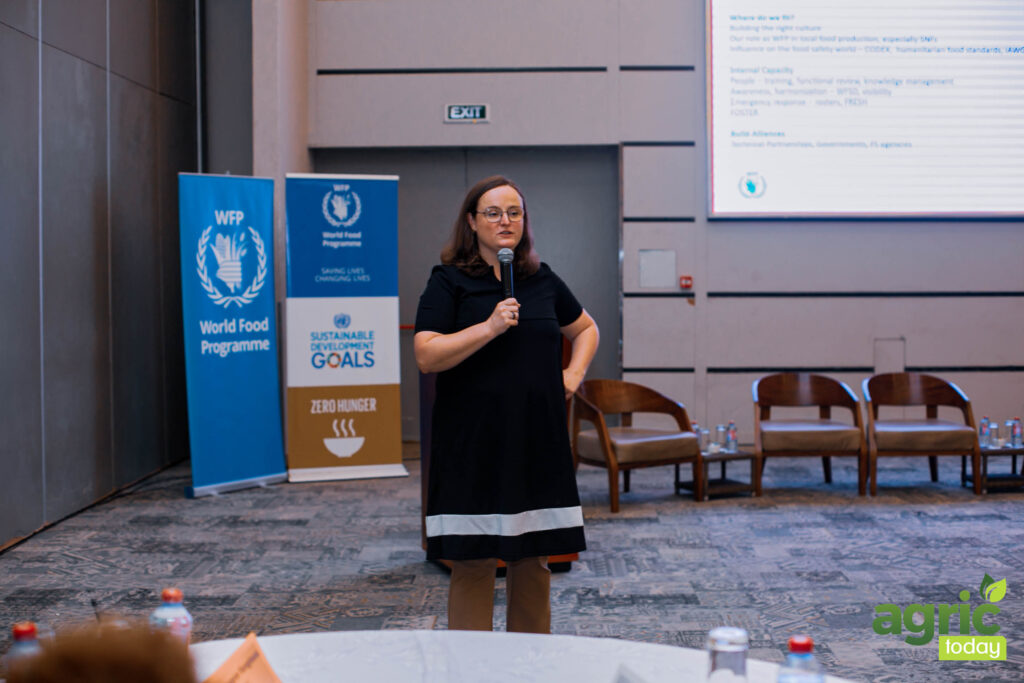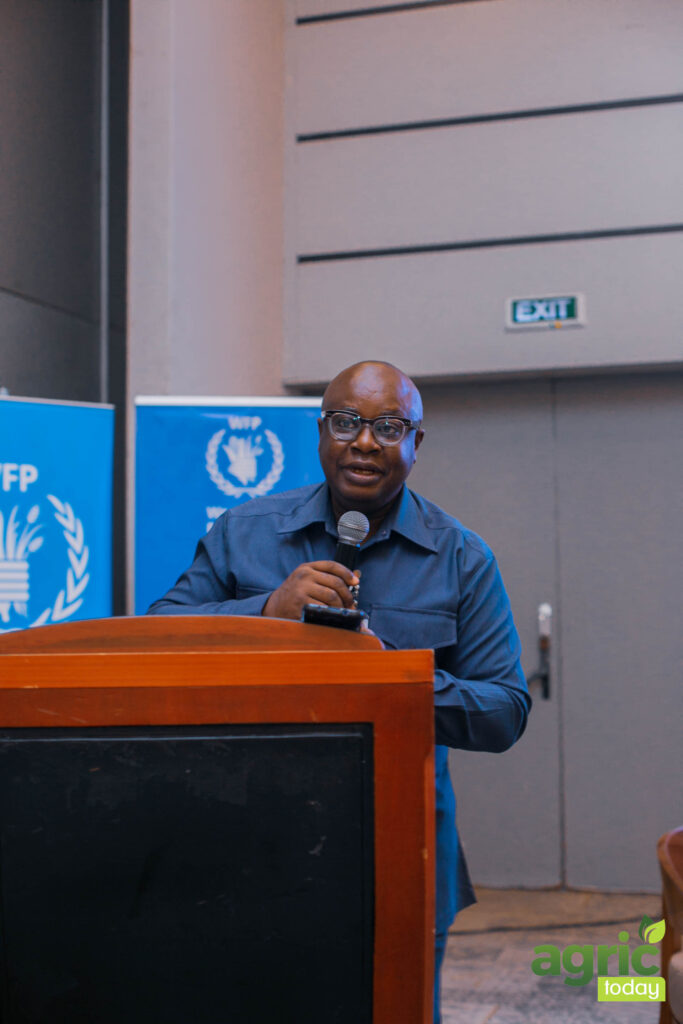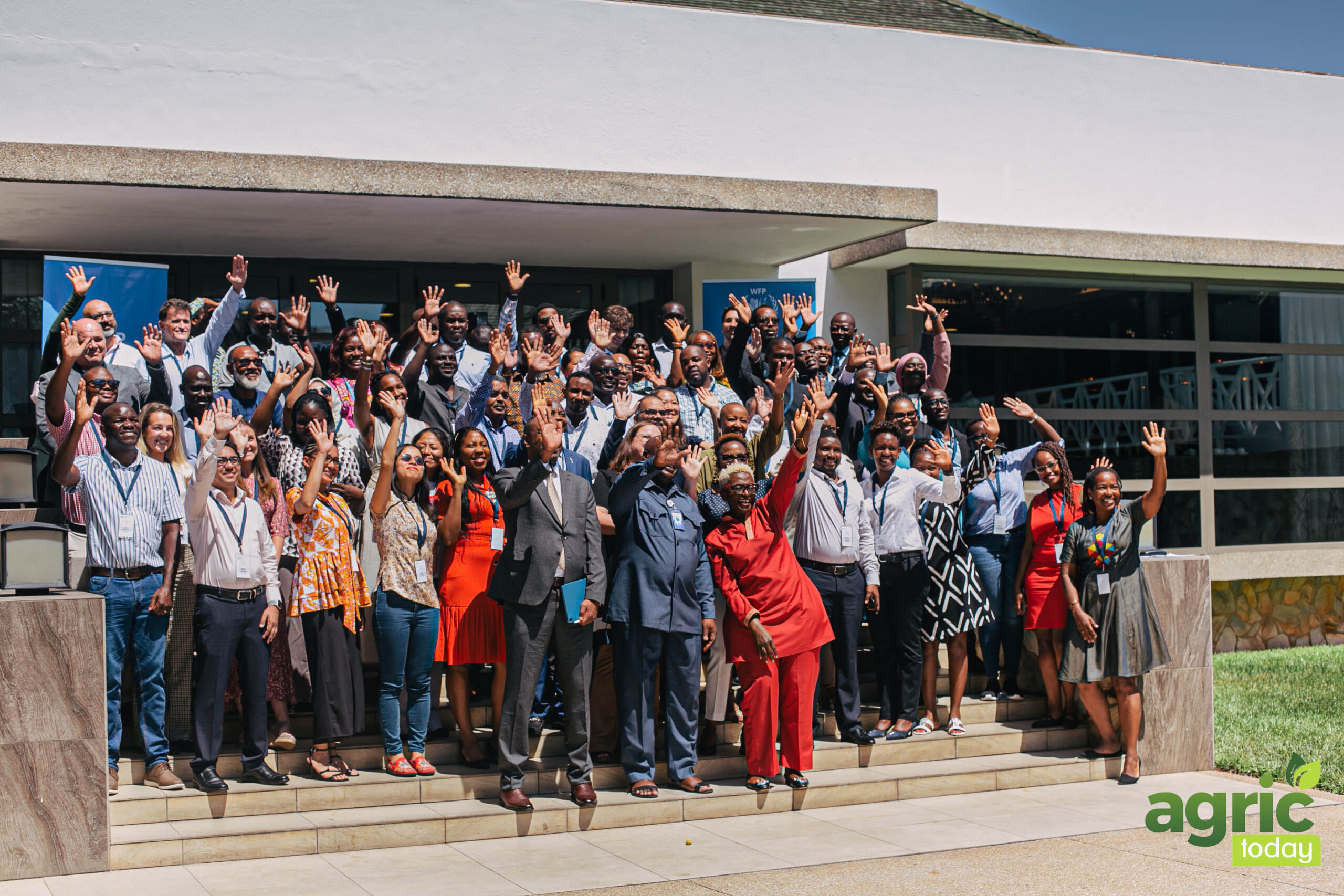The nutritional needs of Africa are rapidly evolving, and WFP is working to address these challenges by supporting the local production, processing, and distribution of a diversity of foods, including grains, cereals, pulses, fortified vegetable oils, and specialized nutritious foods such as fortified cereal blends, fortified peanut butter, instead of importing these foods from outside the African continent.
“We are extremely happy with the work that has been done in Ghana, it has been very successful and become a model for other countries as well and how we are developing local suppliers to make sure that their food safety levels are brought up so that they can also expand and become exporters and supply the local market for us”, Mrs. Virginia Siebenrok – Chief FSQA, WFP HQ, Rome underscored.
According to the Chief of FSQA, there is an unprecedented crisis level across the world now and that has put a lot of strings on food safety and providing safe food for the World Food Programme, however, the attention is to focus on the emerging risk to enhance the basics food safety systems.

She added that this year, WFP is focusing on the African continent by seizing synergies, knowing the regional partners, and ensuring that food is safe for everyone across the content.
“I think food safety can be improved everywhere and it is constantly changing, emerging risks are different depending on the location so we need to adapt what we are seeing locally in different locations. We are much more harmonized with food safety systems worldwide and I must say that food safety systems in Ghana are very impressive and serve as a benchmark for other locations as well”, she explained.
She shared this during the World Food Programme’s African Food Safety and Quality Retreat at Accra, Ghana.
“I am happy to be hosting the retreat for the food safety and quality division of the World Food Programme, We are bringing together a group of personalities from Ghana and other African Regions of the WFP as well as the private sector to discuss food safety and quality (FSQ), specifically, in the Ghanaian context we are working hand in hand with the FDA with the intent that food security remains our utmost concern at WFP”, Ms. Barbara Clemens, WFP Ghana Country Director & Rep. told Agric Today.
In conformity to the development of Ghana’s food safety and quality, the Country Director said WFP operations in Ghana are geared towards the development of supporting the government agenda: Ghana Beyond Aid Initiative that focuses mainly on purchasing made-in-Ghana foods to distribute to vulnerable people.

“We are also looking at how WFP not just working on its own but collective with other great UN bodies to jointly identify gaps with the government and overlaps, how we are going to close those gaps and eliminate the overlaps”, she added.
She added that WFP’s engagement with AFCFTA is key and not to have bilateral relations but to engage the government.
Answering how World Food Programme (WFP) is collaborating with the private sector to achieve the initiative in regard to food safety and quality, Madam Clemens explained that the effects are huge in the sense that WFP has been working closely with the private sector to demystify the erroneous impression that things are more complicated in Africa, but on the real side of it, food safety and quality is eminent and we need to work on Africans image and redefine what people think of Africa in order to make it a more welcoming place to trade.
“We intern not to speak the language of the private sector but to engage them to criticize us on both right and wrongs doings to confirm their inclusion of the initiative”, she confirmed.
Ghana is a practical and perfect example benefitting from the WFP initiative with two industrial food processors, premium foods Ltd in Kwaso in the Ashanti Region and Yedent Agro Group of Companies in Sunyani, to set up new food processing facilities and develop global level food safety and quality management systems. One of these is currently a WFP vendor exporting lifesaving nutritious foods to the most vulnerable countries including Afghanistan, Congo, Burkina Faso, Guinea, Honduras, and Mauritania. The other is producing quality, safe and nutritious foods for the Ghanaian population.
In addition, three smaller food processing facilities which are near completion will soon be commissioned to produce nutritious cereal blends and other local creative foods to meet the nutrition needs of the communities. WFP intends to facilitate and establish multi-user agro-processing firms for various foods in their next strategic plan intended to kick off from 2024-20280. The world needs the collective efforts of the brightest technical experts to safeguard our foods and protect the lives of billions of people around the world
Contribution of the Food and Drugs Authority (FDA) to Food Safety and Quality (FSQ)
Speaking on behalf of the Chief Executive Officer of the FDA, the Deputy Chief Executive, Rodrick Daddey-Agyei said the work of the institution is not only to ensure safe food, but also to ensure micronutrient fortification in selected are compliance with national and international standards.
For instance, the Authority is currently working to revamp the Universal Salt Iodization Programme and enforce the Code of Practice for the Manufacture, Packaging, Distribution, and Sale of Iodised Salt in Ghana among the relevant actors.
To strengthen the local industry in terms of food safety and quality, the Deputy Chief Executive stated that there is a policy called Food Safety Policy that ensures that the various agencies that handle food regulation in Ghana are mandated to work together, by so doing, the areas of operation are clearly defined to prevent any squabbles.
“The Authority in collaboration with NGOs and the private sector has taken steps to bring artisans in the oil palm milling, local rice milling, and cassava processing (that is gari, cassava dough, starch, high-quality cassava flour) into compliance, and have them enrolled on to a scheme called the Progressive Licensing Scheme to ensure safety and enhance marketability”, he added.

He encouraged the local industries to take advantage of the WFP program as well as the FDA because the authority is also working with the Ghana Enterprises Agencies to provide the needed support to the individual to thrive.
FAO Approach and Strategy to Support Food Safety and Quality in Africa.
The Food and Agricultural Organization at the United Nations is key to developing food systems and their quality worldwide.
Speaking at the retreat, Dr. Blaise Ouattara at the FAO Regional Office, Accra outlined the strategic priorities for food safety. According to him, intergovernmental and inter-sectoral coordination of food safety governance is reinforced at all levels and is the number strategic priority for food safety.
He added that sound scientific advice and evidence are provided as the foundation for food safety decision-making. Moreover, national food control systems are further strengthened and are continuously improved, and lastly, public and private stakeholder collaboration is promoted to ensure food safety management and controls through agrifood systems.
For better nutrition for all, Dr. Ouattara explained that healthy diets for all, nutrition for the most vulnerable, safe food for everyone, reducing food loss and waste, and transparent markets and trade are the major safety priorities to ensure better nutrition across the continent.
The retreat fostered the expected strategic collaboration and dialogue among key stakeholders for food safety and quality on the African continent; an agreed vision for food safety and quality and share strategic direction; a continued forum for knowledge exchange and sharing ideas that will have an immediate effect on the food safety quality work across the continent; and combined and integrated food safety quality strategies around WFP country strategic plans which will produce a continental synergy in tackling the common and prevailing food safety issues.








